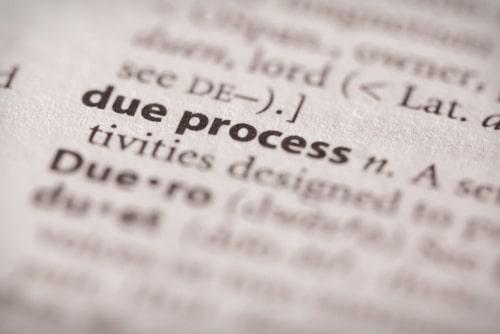Recent Blog Posts
What Does Chicago's Ban on Assault Weapons Mean?
 Since 2019, the city of Chicago has put a ban on “assault weapons.” This law was in response to a series of mass shootings taking place in Illinois and across the entire nation, mostly involving large, automatic rifles. No single, unified definition of an “assault weapon” exists. States have turned to varying formulations and definitions in an attempt to define what constitutes an “assault weapon.” It is important for Cook County gun owners to be familiar with how the law actually defines possession of an assault weapon, lest you find yourself facing a firearms charge.
Since 2019, the city of Chicago has put a ban on “assault weapons.” This law was in response to a series of mass shootings taking place in Illinois and across the entire nation, mostly involving large, automatic rifles. No single, unified definition of an “assault weapon” exists. States have turned to varying formulations and definitions in an attempt to define what constitutes an “assault weapon.” It is important for Cook County gun owners to be familiar with how the law actually defines possession of an assault weapon, lest you find yourself facing a firearms charge.
What is the Definition of an Assault Weapon in Chicago?
There are several ways to be in possession of an “assault weapon” in Chicago. City code defines an assault weapon as “any weapon that shoots . . . automatically, more than one shot, without manual reloading, by a single function of the trigger.” This definition would include all automatic rifles. If you hold down the trigger and more than one bullet comes out, you may be looking at an assault weapon by Chicago’s standards.
What Does "Mutual Combat" Mean?
 A recent decision by Cook County prosecutors not to pursue charges against five suspected gang members involved in a fatal Chicago shootout left many locals surprised and confused. Although all five were arrested on suspicion of murder and aggravated battery, they were later released from jail without being formally charged. The reason prosecutors cite for declining to charge the shooters is that they were engaged in “mutual combat,” according to a police report. But what does that mean?
A recent decision by Cook County prosecutors not to pursue charges against five suspected gang members involved in a fatal Chicago shootout left many locals surprised and confused. Although all five were arrested on suspicion of murder and aggravated battery, they were later released from jail without being formally charged. The reason prosecutors cite for declining to charge the shooters is that they were engaged in “mutual combat,” according to a police report. But what does that mean?
If you are facing violent crime charges of any type, contacting an attorney as soon as possible is of great importance. You may have defenses available to you depending on the circumstances of your individual case, but you will need an experienced attorney to put on the best possible defense.
What Is the Legal Definition of “Mutual Combat”?
6 Alternatives to a Prison Sentence in Cook County, Illinois
 If you have been arrested and charged with a crime, your highest priority is likely to avoid conviction altogether. However, if you are ultimately convicted, you still may have hopes of avoiding a prison sentence. Fortunately, it is sometimes possible for criminal defendants in Cook County to avoid prison time through an alternative sentencing program. An attorney can help you determine whether you may be eligible for alternative sentencing and negotiate on your behalf with the goal of achieving this outcome.
If you have been arrested and charged with a crime, your highest priority is likely to avoid conviction altogether. However, if you are ultimately convicted, you still may have hopes of avoiding a prison sentence. Fortunately, it is sometimes possible for criminal defendants in Cook County to avoid prison time through an alternative sentencing program. An attorney can help you determine whether you may be eligible for alternative sentencing and negotiate on your behalf with the goal of achieving this outcome.
Cook County Alternative Sentencing Options
The availability of alternative sentencing largely depends on the county in which you are facing charges. Cook County offers several different programs that may be available to you, including:
- Deferred prosecution - Certain non-violent misdemeanor and felony offenders may be eligible for a deferred prosecution program if they have no prior convictions and have not participated in the program before. The program typically requires the offender to complete requirements including education and community service within a specified time frame, after which their charges can be dismissed.
Illinois Set to End Cash Bail for Criminal Defendants By 2023
 In Illinois, a conviction for a criminal offense can result in serious consequences including fines and imprisonment. However, many criminal defendants face hardship even before their trial due to policies like cash bail requirements for pretrial release. Cash bail policies are especially difficult for low-income defendants who may not have the resources to post bail, and who therefore must remain in custody while waiting for trial. Fortunately, Illinois has recently passed a bill that will end the use of cash bail in the coming years.
In Illinois, a conviction for a criminal offense can result in serious consequences including fines and imprisonment. However, many criminal defendants face hardship even before their trial due to policies like cash bail requirements for pretrial release. Cash bail policies are especially difficult for low-income defendants who may not have the resources to post bail, and who therefore must remain in custody while waiting for trial. Fortunately, Illinois has recently passed a bill that will end the use of cash bail in the coming years.
The Illinois Pretrial Fairness Act
In February 2021, the Illinois legislature passed House Bill 3653, ushering in large-scale changes to the state’s criminal justice system. Some components of the bill have already taken effect, while others will continue to be phased in over time. One major component of the bill is the Illinois Pretrial Fairness Act, which will eliminate cash bail statewide by January 1, 2023. Notably, Illinois is the first state in the U.S. to pass legislation to end cash bail.
Understanding Due Process and the Bill Cosby Case
 If you have picked up any newspaper or turned on cable news in the past few days, you have likely heard that actor/comedian Bill Cosby was released from prison this week after the Pennsylvania Supreme Court overturned his 2018 sexual assault conviction. In its decision, the court wrote that Cosby’s due process rights were violated. While many legal scholars have agreed that the court made the right decision, many people across the country, including Cosby’s accusers, are outraged by the decision and Cosby’s freedom.
If you have picked up any newspaper or turned on cable news in the past few days, you have likely heard that actor/comedian Bill Cosby was released from prison this week after the Pennsylvania Supreme Court overturned his 2018 sexual assault conviction. In its decision, the court wrote that Cosby’s due process rights were violated. While many legal scholars have agreed that the court made the right decision, many people across the country, including Cosby’s accusers, are outraged by the decision and Cosby’s freedom.
The Case
In 2018, a Pennsylvania jury found Cosby guilty of drugging and sexually assaulting a victim in his home in 2004. In 2005, the victim went to the police about the assault, but no criminal charges were pressed. The following year, the victim and Cosby reached a $3.4 million settlement in a civil lawsuit.
Can I Be Arrested for Possession of Stolen Property in Illinois?
 It should come as no surprise that taking property that does not lawfully belong to you is a criminal offense, and in Illinois, you could face misdemeanor or felony theft charges depending on the circumstances. However, you may be unaware that simply having stolen property in your possession can also be a crime, even if you are not the person who originally stole it. It can come as a shock to be charged with possession of stolen property, especially if you were not aware that it was stolen. In these cases, you should work with an attorney who can help you present a strong defense to the charges you are facing.
It should come as no surprise that taking property that does not lawfully belong to you is a criminal offense, and in Illinois, you could face misdemeanor or felony theft charges depending on the circumstances. However, you may be unaware that simply having stolen property in your possession can also be a crime, even if you are not the person who originally stole it. It can come as a shock to be charged with possession of stolen property, especially if you were not aware that it was stolen. In these cases, you should work with an attorney who can help you present a strong defense to the charges you are facing.
Illinois Law Regarding Possession of Stolen Property
The Illinois Criminal Code defines several different actions that are considered criminal theft. Most of them involve actively seizing another person’s property, whether by threat, force, deception, or without the person’s knowledge. However, state law also makes it a crime to “obtain control over stolen property” if the recipient knows that it is stolen or should reasonably be aware that it is stolen.
Can the Police Obtain a No-Knock Search Warrant in Illinois?
 Over the last year, the use of no-knock search warrants in criminal cases has come under increased scrutiny due to the risk of harm to innocent and vulnerable people who may be on the property. In fact, many cities and police departments have started to ban the practice outright. However, the State of Illinois still allows no-knock warrants under some circumstances, and if your property is subject to a warrant, it is crucial that you understand your rights.
Over the last year, the use of no-knock search warrants in criminal cases has come under increased scrutiny due to the risk of harm to innocent and vulnerable people who may be on the property. In fact, many cities and police departments have started to ban the practice outright. However, the State of Illinois still allows no-knock warrants under some circumstances, and if your property is subject to a warrant, it is crucial that you understand your rights.
When Can a Search Warrant Be Issued in Illinois?
The Fourth Amendment in the U.S. Bill of Rights provides protection from unreasonable search and seizure, meaning that law enforcement cannot simply search a person’s property on a whim. In most cases, officers will first need to obtain a search warrant, and in order to do so, they must demonstrate that there is probable cause to believe that evidence of a crime will be found on the property. Warrants are often used in cases involving drug possession and distribution, illegal weapons possession, stolen property, and kidnapping, among others.
What Are the Penalties for Possession of a Weapon by a Felon in Illinois?
 In Illinois and throughout the U.S., people have the constitutional right to bear arms. However, that does not mean the possession of firearms and other weapons is unregulated. Illinois prohibits the possession of certain kinds of weapons outright and requires gun owners to obtain a Firearm Owners ID card (FOID) in order to be in compliance with state law. If you have been convicted of a felony in Illinois or another state, your FOID can be revoked, and future applications for an FOID can be denied. You may also face serious criminal penalties if you are found to be in unlawful possession of a weapon with a previous felony conviction on your record.
In Illinois and throughout the U.S., people have the constitutional right to bear arms. However, that does not mean the possession of firearms and other weapons is unregulated. Illinois prohibits the possession of certain kinds of weapons outright and requires gun owners to obtain a Firearm Owners ID card (FOID) in order to be in compliance with state law. If you have been convicted of a felony in Illinois or another state, your FOID can be revoked, and future applications for an FOID can be denied. You may also face serious criminal penalties if you are found to be in unlawful possession of a weapon with a previous felony conviction on your record.
What Types of Weapons Are Prohibited for Convicted Felons?
As with all people in the State of Illinois, convicted felons are prohibited from knowingly possessing certain kinds of dangerous weapons under any circumstances, including bludgeons, metal knuckles, throwing stars, and switchblades. However, convicted felons are, under most circumstances, also prohibited from possessing any kind of firearm or ammunition, even those that are legally permitted in Illinois under other circumstances. The only exception is a situation in which a felon has successfully appealed for relief in court or with the Director of the Illinois State Police.
When Is DUI Considered a Felony in Illinois?

Driving under the influence of alcohol or drugs seriously endangers both the driver and other people on the road, and as such, it is treated as a serious offense under Illinois law. Depending on the circumstances, a first-time DUI offender may be fortunate to receive only a one-year driver’s license revocation and court supervision, but a misdemeanor conviction with fines and jail time is also possible. Additionally, certain aggravating factors can mean that even a first offense is charged as a felony. If you are facing charges of aggravated DUI, you need an attorney who can help you understand and protect your rights.
Illinois Aggravated DUI Offenses
In Illinois, a variety of actions can constitute an aggravated DUI offense, regardless of whether the offender has any prior DUI convictions. Some examples include:
Can I Be Arrested for Speeding in Illinois?

While no one is happy to receive a speeding ticket, many people view them as a nuisance at worst, possibly meaning that they have to pay a fine or make an appearance in traffic court. However, in Illinois, the consequences for speeding can be significantly more severe depending on the circumstances. If you are charged with aggravated speeding, you can be arrested, and you may face a criminal conviction and the accompanying sentence.
What Qualifies as Aggravated Speeding in Illinois?
A person can be ticketed for speeding in Illinois if they exceed the posted speed limit by any amount, but in most cases, doing so is considered a petty offense. However, when a driver exceeds the speed limit by more than 25 miles per hour, the offense becomes a criminal misdemeanor known as aggravated speeding. Driving at a speed of 26 to 34 miles per hour above the speed limit is a Class B misdemeanor, and a conviction can result in a sentence of up to six months in jail and up to $1,500 in fines. At a speed of 35 miles per hour or more above the speed limit, a driver can face Class A misdemeanor charges, with a possible sentence of up to one year in jail and fines up to $2,500.













 312-345-1700
312-345-1700



